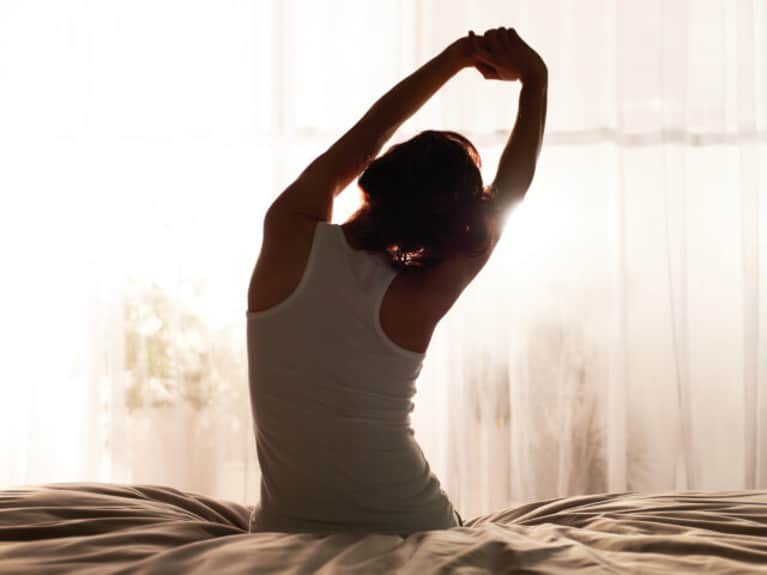
Menopause doesn't have to ruin your sleep. Ways to help, and prep before going through menopause.
During her mid-50s, school teacher and yoga instructor Anita Perry began experiencing awful sleep disturbances. For someone who always felt cold, she often woke up in sweat, and started sleeping with the windows open and a fan on. "Besides the hot flashes, I seemed to wake up every hour on the hour, and couldn't get a full night's sleep," she remembers.
The reason for these sleep disruptions: Perry had entered perimenopause—the period before menopause when women's hormone levels, including estrogen, begin to fluctuate and decline.
Hot flashes, night sweats, insomnia—perimenopause and menopause symptoms—can wreak havoc on women and their sleep. It's no wonder women dread the changes that come with the end of their menstrual period.
But women in their 40s and 50s can stop perimenopause and menopause from hijacking their sleep. Dr. JoAnn Pinkerton, executive director of The North American Menopause Society, offers insight into putting the brakes on related symptoms that interrupt your shut-eye.
Hot Flashes and Night Sweats
Up to 80 percent of midlife women experience hot flashes or night sweats, says Pinkerton. These vasomotor symptoms last an average of seven years as women move through perimenopause and menopause, according to a study published in JAMA Internal Medicine.
What you can do: Avoid alcohol, caffeine, and spicy foods before bed. These may trigger night sweats and hot flashes. Keep a glass of ice water nearby to squelch symptoms once they begin. Drink the ice water, but don't get out of bed, suggests Pinkerton. Instead, try to fall back asleep as soon as you cool down. "You want to stay in bed to avoid disrupting your sleep further," she recommends. To stay cool during sleep, Pinkerton recommends wearing clothing that wicks moisture away from your skin, lowering the room temperature, sleeping with a fan on or using cooling gel pillows.
Blogger Meridith Dennis, co-founder and CEO of Project Eve shares how the DualTemp layer on her mattress helps her through menopause.
Mid-Life Sleep Disturbances
Figuring out what's to blame for sleep disturbances during menopause can be a confusing medical puzzle since many health issues can begin or worsen during midlife. Depression, irritability, anxiety, nervousness, and loss of concentration can all contribute to sleep disturbances, including insomnia, notes Pinkerton. Menopause doesn't get all the blame, though.
"These symptoms are not directly related to the decreases in estrogen levels that occur with menopause," says Pinkerton. "There may be other factors, such as aging itself or other health issues, but they are definitely worsened during perimenopause and menopause."
When it comes to the mental health issues, such as anxiety or depression, "midlife stresses such as struggles with adolescent [children], concerns about aging, caring for aging parents, and changes in marital relationship, may contribute to sleep disturbances," explains Pinkerton.
What you can do: Women in their 40s should maintain a regular exercise program through perimenopause and menopause, suggests Pinkerton, especially when you start to experience other midlife stressors.
"Women need to find a way to get bursts of energy to get them through," she says. Good sleep hygiene helps too. Most menopausal women aren't getting the recommended seven hours of sleep each night, states Pinkerton. "Set up a bedtime routine and stick with it. This will help trigger your brain and body to prepare for rest."
Blogger Shannon Fox, author and founder of Fox Hollow Cottage, relies on her DualTemp™ Layer to sleep cool and comfy all night long during menopause.
To manage her symptoms, Perry relied on her daily yoga and meditation routine, but also made dietary changes, limiting her caffeine intake, drinking more water and green shakes, and eating organic, healthful food. "Since I have followed this regimen, the symptoms are still there but bearable," tells Perry, now age 62 and two years past full menopause. "I can sleep about five hours now without waking."
Like diet and exercise, quality sleep is essential for optimal wellbeing and performance. Because everyone's sleep needs are different, Sleep Number® smart beds sense your movements and automatically adjust firmness, comfort and support to keep you both sleeping comfortably. Find your Sleep Number® setting for your best possible night's sleep.